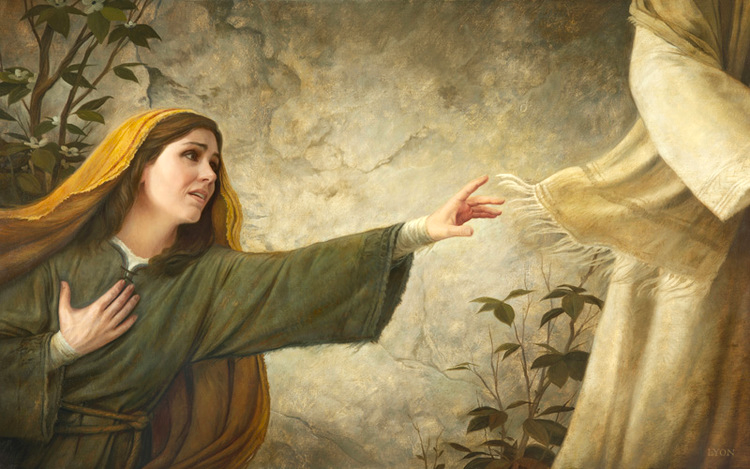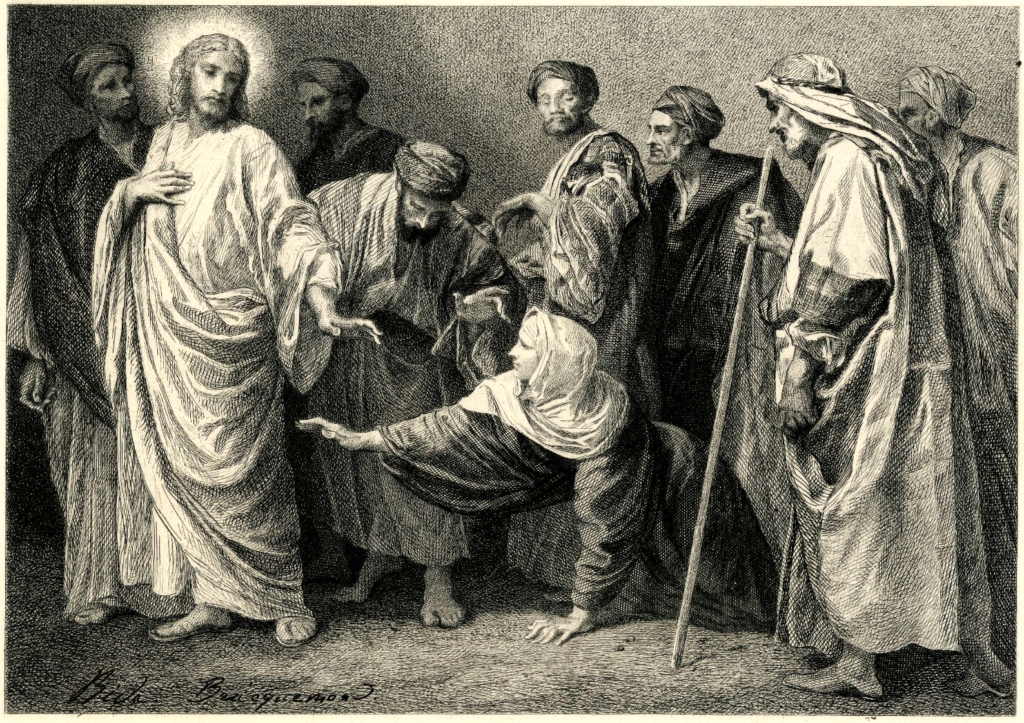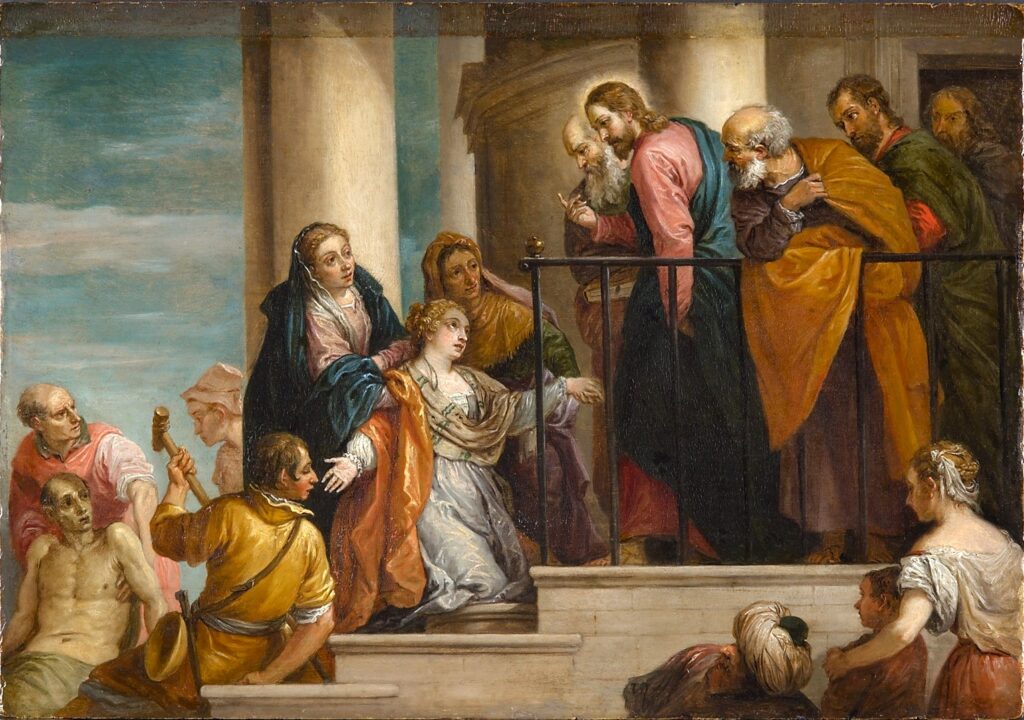Translation From the Holy Gospel According to Matthew
At that time, as Jesus was speaking to the multitudes, behold a certain ruler came up, and adored Him, saying: Lord, my daughter is even now dead; but come lay Thy hand upon her, and she shall live. And Jesus, rising up, followed him, with His disciples. And behold a woman, who was troubled with an issue of blood twelve years, came behind Him, and touched the hem of His garment. For she said within herself: If I shall touch only His garment, I shall be healed. But Jesus turning and seeing her, said: Be of good heart, daughter, thy faith hath made thee whole. And the woman was made whole from that hour. And when Jesus was come into the house of the ruler, and saw the minstrels and the multitude making a tumult, He said: Give place; for the girl is not dead, but sleeps. And they laughed Him to scorn. And when the multitude was put forth, He went in and took her by the hand. And the maid arose. And the fame thereof went abroad into all that country.
A Message from St. John Chrysostom’s Homilies on Mathew, No. 31.
And, behold, it is said, a woman that had an issue of blood twelve years, came behind Him, and touched the hem of His garment. For she said within herself, If I may but touch His garment, I shall be whole.
Wherefore did she not approach Him boldly? She was ashamed on account of her affliction, accounting herself to be unclean. For if the menstruous woman was judged not to be clean, much more would she have the same thought, who was afflicted with such a disease; since in fact that complaint was under the law accounted a great uncleanness. Therefore she lies hidden, and conceals herself. For neither had she as yet the proper and correct opinion concerning Him: else she would not have thought to be concealed. And this is the first woman that came unto Him in public, having heard of course that He heals women also, and that He is on His way to the little daughter that was dead.
And she durst not invite him to her house, although she was wealthy; nay, neither did she approach publicly, but secretly with faith she touched His garments. For she did not doubt, nor say in herself, “Shall I indeed be delivered from the disease? shall I indeed fail of deliverance?” But confident of her health, she so approached Him. For she said, we read, “in herself, If I may only touch His garment, I shall be whole. Yea, for she saw out of what manner of house He was come, that of the publicans, and who they were that followed Him, sinners and publicans; and all these things made her to be of good hope.
What then doth Christ? He suffers her not to be hid, but brings her into the midst, and makes her manifest for many purposes.
It is true indeed that some of the senseless ones say, “He does this for love of glory. For why,” say they, “did He not suffer her to be hid?” What sayest thou, unholy, yea, all unholy one? He that enjoins silence, He that passes by miracles innumerable, is He in love with glory?
For what intent then doth He bring her forward? In the first place He puts an end to the woman’s fear, lest being pricked by her conscience, as having stolen the gift, she should abide in agony. In the second place, He sets her right, in respect of her thinking to be hid. Thirdly, He exhibits her faith to all, so as to provoke the rest also to emulation; and His staying of the fountains of her blood was no greater sign than He affords in signifying His knowledge of all things. Moreover the ruler of the synagogue, who was on the point of thorough unbelief, and so of utter ruin, He corrects by the woman. Since both they that came said, Trouble not the Master, for the damsel is dead; and those in the house laughed Him to scorn, when He said, She sleepeth; and it was likely that the father too should have experienced some such feeling. Therefore to correct this weakness beforehand, He brings forward the simple woman. For as to that ruler being quite of the grosser sort, hear what He saith unto him: Fear not, do thou believe only, and she shall be made whole.
Thus He waited also on purpose for death to come on, and that then He should arrive; in order that the proof of the resurrection might be distinct. With this view He both walks more leisurely, and discourses more with the woman; that He might give time for the damsel to die, and for those to come, who told of it, and said, Trouble not the Master. This again surely the evangelist obscurely signifies, when he saith, While He yet spake, there came from the house certain which said, Thy daughter is dead, trouble not the Master. For His will was that her death should be believed, that her resurrection might not be suspected. And this He doth in every instance. So also in the case of Lazarus, He waited a first and a second and a third day
On account then of all these things He brings her forward, and saith, Daughter, be of good cheer, even as He had said also to the paralyzed person, “Son, be of good cheer.” Because in truth the woman was exceedingly alarmed; therefore He saith, be of good cheer, and He calls her “daughter;” for her faith had made her a daughter. After that comes also her praise: Thy faith hath made thee whole.
But Luke tells us also other things more than these concerning the woman. Thus, when she had approached Him, saith he, and had received her health, Christ did not immediately call her, but first He saith, Which is he that touched me? Then when Peter and they that were with Him said, Master, the multitude throng Thee, and press Thee, and sayest Thou, who touched me? (which was a very sure sign both that He was encompassed with real flesh, and that He trampled on all vainglory, for they did not follow Him at all afar off, but thronged Him on every side); He for His part continued to say, Somebody hath touched me, for I perceive that virtue is gone out of me; answering after a grosser manner according to the impression of His hearers. But these things He said, that He might also induce her of herself to make confession. For on this account neither did He immediately convict her, in order that having signified that He knows all things clearly, He might induce her of her own accord to publish all, and work upon her to proclaim herself what had been done, and that He might not incur suspicion bysaying it.
Seest thou the woman superior to the ruler of the synagogue? She detained Him not, she took no hold of Him, but touched Him only with the end of her fingers, and though she came later, she first went away healed. And he indeed was bringing the Physician altogether to his house, but for her a mere touch suffered. For though she was bound by her affliction, yet her faith had given her wings. And mark how He comforts her, saying, Thy faith hath saved thee. Now surely, had He drawn her forward for display, He would not have added this; but He saith this, partly teaching the ruler of the synagogue to believe, partly proclaiming the woman’s praise, and affording her by these words delight and advantage equal to her bodily health.
For that He did this as minded to glorify her, and to amend others, and not to show Himself glorious, is manifest from hence; that He indeed would have been equally an object of admiration even without this (for the miracles were pouring around Him faster than the snow-flakes, and He both had done and was to do far greater things than these): but the woman, had this not happened, would have gone away hid, deprived of those great praises. For this cause He brought her forward, and proclaimed her praise, and cast out her fear, (for she came, it is said, trembling); and He caused her to be of good courage, and together with health of body, He gave her also other provisions for her journey, in that He said, Go in peace.



